| |
When Richmond was selected as the location for the UC/LNBL expansion campus in 2012, pretty much everyone was ecstatic. The entire City had pulled together and worked hard to win the competition. The NY Times reported:
Richmond’s eagerness for the campus apparently played a role in its selection, according to A. Paul Alivisatos, the lab’s director, who pointed to “an outstanding show of community support.” More than 700 residents attended the lab’s information night. The city put up a billboard along Interstate 580 that flashed “Richmond ♥ LBNL.” It printed buttons and postcards and had more than 500 residents write personal notes to lab employees inviting them to the city.
At the time, as the NY Times went on to say, “Richmond, which has a 17 percent jobless rate and a tax base that has declined by double digits in recent years, considers the second lab potentially transformative. Residents will be in a position to get some of the construction jobs. Developers are expected to construct buildings to accommodate spinoff businesses.”
The good news is that three years later, Richmond’s jobless rate has dipped to 5.8% and home values have appreciated 100%. The bad news is that Congress and the Federal Department of Energy failed to fund the ambitious Lawrence Berkeley National Laboratory expansion, and that project never got off the ground. UC Berkeley, however, reimagined the site as the “UC Berkeley Global Campus at Richmond Bay” and proceeded to ambitiously plan another type of campus expansion, hoping to attract major funding from international sources or wealthy corporations. So far, only the planning is moving forward – no funding has been secured.
For some activists, however, the ecstasy and eagerness of 2012 has now turned to anger, as activists from ACCE and CCISCO, among others, accused the University of profiteering at the expense of Richmond. Although no buildings are on the drawing board, no funding has been secured, no construction contracts have been let and no employees are being hired, protestors demanding a binding community benefits agreement have recently broken up a Regents meeting and affixed a banner to the chancellor’s front door.


A Daily Californian article reported:
“(Campus administrators) are thinking about profit over the people of Richmond,” said Melvin Willis, a Richmond resident and community activist who spoke at the event. “The UC needs to be a public service institution, not a money-making engine.”
The Haas Institute for a Fair and Inclusive Society (no connection with the Haas School of Business), an advocacy organization that trades on its UC Berkeley connection for undeserved legitimacy, has fueled these protests with poorly researched papers that suggest the Global Campus will have substantial adverse impacts on Richmond unless mitigated by commitments secured by a community benefits agreement from UC Berkley that must be executed right now to guarantee jobs for Richmond residents, assistance for Richmond schools and funds to build Richmond housing. From the Haas Institute website:
Anchor Richmond Report - The Haas Institute for a Fair and Inclusive Society released a new report on Oct. 30. Anchor Richmond: Community & Anchor Strategies for the Berkeley Global Campus at Richmond Bay examines the potential impacts and opportunities of a large new development project to be built in one of the region’s most economically distressed cities - Richmond, Calif. Haas Institute researchers and community advocates from Contra Costa Interfaith Service Organization (CCISCO), Alliance of Californians for Community Empowerment (ACCE), and Safe Return Project co-authored the report on the Berkeley Global Campus at Richmond Bay. The program makes recommendations on housing, jobs, education and building wealth.
The Haas report on the Global Campus was followed by a second paper, Belonging and Community Health in Richmond; An Analysis of Changing Demographics and Housing warning of incipient gentrification in Richmond.
While we all want to maximize every opportunity for Richmond to benefit from the UC Berkeley Global Campus, the level of vitriol and impatience demonstrated by these activist organizations is baffling. A “Working Group” with a majority of its 21 members representing Richmond and Richmond organizations has been meeting regularly to work through these issues and find workable, win-win resolutions as planning for the campus proceeds. But ACCE, CCISCO and even AFSCME wants to cut through that process even before it has had a chance to work. AFSCME, which has ongoing issues with UC Berkeley, is trying to join up with other activists to use the yet non-existent Global Campus to leverage negotiations on other issues:
Of particular concern to AFSCME members is the threat of contracting out at the BGC. “UC likes to staff with temporary contract workers,” says Luster Howard, a Richmond resident and executive board member of Local 3299 who earns $60,000 a year as a driver for LBNL. “I have friends and family who need job opportunities. We already have plenty of ‘McJobs” in Richmond. We need better ones.” (http://www.afscme3299.org/2015/04/09/going-global-in-richmond-coalition-seeks-benefits-from-new-uc-berkeley-campus/).
I don’t have any problem with a community benefits agreement, and in fact, I even voted for a City Council resolution supporting an eventual agreement, but I do not believe the tactics and misinformation being used by ACCE, CCISCO, AFSCME, the Haas Institute and others are appropriate or productive. The University of California is not Chevron, and it is not a profit-driven wealthy real estate developer. We have no regulatory power over the University of California, and they need no permits or entitlements from the City of Richmond. They are, like us, a public agency. Our relationship with the University calls for collaboration, not confrontation.
Richmond, with its sympathetic and super-progressive majority City Council is increasingly being used as a laboratory for social activists, many from outside Richmond, to use Richmond as a venue to implement initiatives they are unable to move forward elsewhere, even though the underlying justification may be much greater elsewhere.
Respect Richmond Coalition hosts speak-out, protests outside chancellor’s residence
Wednesday, April 22, 2015
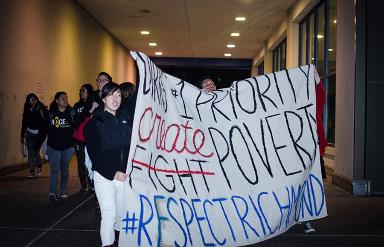
Jihoon Park/Staff
By Ishaan Srivastava | Staff
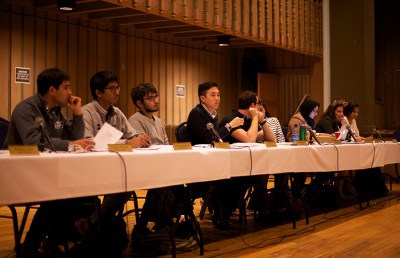
ASUC senators express concerns about Richmond Bay campus, talk addressing anti-Semitism
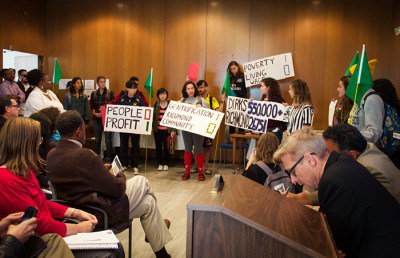
Student Labor Committee crashes Dirks’ update on Berkeley Global Campus at Richmond Bay
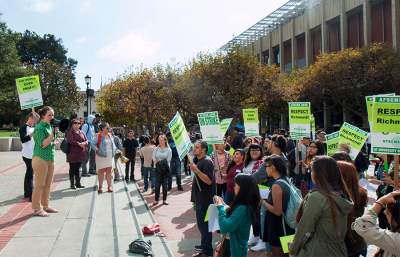
Students, workers demand community benefits agreement for Richmond Bay Campus
Student activists hosted a “speak-out” on campus Wednesday night, criticizing the campus administration for having not yet signed a community benefits agreement with Richmond residents despite the impending construction of the Berkeley Global Campus at Richmond Bay.
Attended by more than 60 students and community members, the event was organized by the recently formed Respect Richmond Coalition, a student group with representatives from a variety of campus organizations including but not limited to the ASUC Sustainability Team, the Black Student Union and the Student Labor Committee. At the event, four Richmond residents expressed their frustrations with campus administration, which they said had failed to respond to their concerns that the new campus could potentially gentrify the surrounding area in Richmond.
“(Campus administrators) are thinking about profit over the people of Richmond,” said Melvin Willis, a Richmond resident and community activist who spoke at the event. “The UC needs to be a public service institution, not a money-making engine.”
After the hourlong speak-out, many students and community members walked over to Chancellor Nicholas Dirks’ residence, protesting what they believed to be his failure to listen to their demands. While taping a large banner with their demands to his front door, they chanted slogans ranging from “Respect Richmond” to “Hey Dirks, you can’t hide, we can see your greedy side.”
According to coalition member Audrey Mancini, the group formed to coordinate campus efforts and to compel Dirks to sign a legally binding agreement with the city of Richmond. A draft of the agreement includes provisions to institute a living wage policy, subsidize affordable housing units and invest in opportunities for small local businesses.
Campus spokesperson Dan Mogulof said in an email that while the administration has not ruled out the possibility of an agreement, it wishes to pursue what it perceives to be more effective alternatives.
“Community interests might actually be better served through targeted, specific memoranda of understanding with civic, labor and municipal groups,” Mogulof said. “Given we don’t even currently have a defined construction project, we are clearly not at the point where there could be an agreement.”
Mogulof said agreements will be drafted by the administration based on recommendations to be made in November by a community working group.
Richmond residents who spoke at the event said they would oppose any agreement made by what Willis called a working group “hand-picked” by campus administration.
“Not only will it be a watered-down version of what we’re asking for, but there’s also no legal guarantee that the administration will listen to the working group,“ Willis said.
Mancini said the group was satisfied with the event and will be preparing to organize another demonstration at Sather Gate on April 30.
“We’ve made our point, but we’re not going to stop here,” she said.
Contact Ishaan Srivastava at isrivastava@dailycal.org and follow him on Twitter @ishaansriv.
mond and we think it will be good for the whole East Bay.”
Going Global in Richmond? Coalition Seeks Benefits From New UC Berkeley Campus
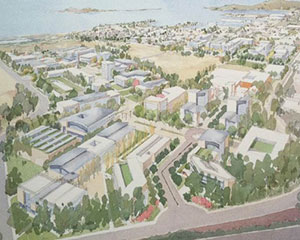
by Steve Early
Members of AFSCME Local 3299 who in live in Richmond, CA. and work for the University of California in Berkeley have an urgent message for their neighbors:
“When the university plans a major expansion in our city, we need to get all its promises in writing!’
AFSCME activists base that sound trade union advice on their most recent contract bargaining –and on-going skirmishes–with the UC system. In 2013-14, it took more than a year of difficult negotiations, plus statewide strike activity, to win the collective bargaining agreement that currently covers 8,300 UC service workers.
Several hundred Richmond residents are employed in this bargaining unit. According to AFSCME, their labor has been so undervalued in the past that some of the union’s Black and Latino members at UC could even qualify for public assistance
Now, some AFSCME rank-and-filers are campaigning, with student and community allies, for a different kind of “CBA.” At meetings on campus, in local churches, and other venues, they are pressuring the university to sign a “community benefits agreement” that would apply to the “Berkeley Global Campus” (BGC) that UC-plans to build on the south Richmond shoreline, in partnership with private developers and the Lawrence Berkeley National Laboratories (LBNL).
“McJobs” or Better Jobs?
In Richmond, AFSCME’s campaign partners include the Alliance of Californians for Community Empowerment (ACCE), the Contra Costa Interfaith Supporting Community Organization (CCISCO), and the Richmond Progressive Alliance (RPA). The RPA helped elect three of its own members to the city council last Fall and did voter turnout for Tom Butt, the city’s new mayor, and Jael Myrick, an incumbent city councilor who works for Assemblywoman Nancy Skinner. (See http://www.beyondchron.org/crude-effective-big-business-air-war-fails-sink-richmond-progressives/)
Like their counterparts in economic development fights across the country, the coalition lobbying UC has a long list of demands. These were embraced by the new Richmond Council, on paper at least, in late February. By a 5 to 1 vote, city councilors, including new mayor Tom Butt, urged “UCB to reach a legally-binding agreement with community stakeholders” that would commit the BGC to local hiring, job training, and “living wage” standards; use of unionized construction labor; respect for collective bargaining rights of campus workers; use of local businesses as vendors; and creation of an “anti-displacement fund to subsidize the development of affordable housing units and protect low income tenants” from gentrification of adjoining neighborhoods.
Of particular concern to AFSCME members is the threat of contracting out at the BGC. “UC likes to staff with temporary contract workers,” says Luster Howard, a Richmond resident and executive board member of Local 3299 who earns $60,000 a year as a driver for LBNL. “I have friends and family who need job opportunities. We already have plenty of ‘McJobs” in Richmond. We need better ones.”
A Private Development Catalyst
If Chancellor Nicholas Dirks’ sweeping vision of the Richmond project attracts sufficient private capital and unfolds on schedule, the BGC could be Richmond’s largest employer within a decade—with a bigger workforce than Chevron and Kaiser. The new educational and research complex Dirks wants to create would be its biggest expansion in 147 years, adding 40 percent to UCB’s existing campus infrastructure.
According to Dirks, the BGC will function as an “international hub where some of the world’s leading universities and high-tech companies will work side-by-side in a campus setting…advancing knowledge in bioscience, health, energy development, and data studies”—all funded by hundreds of millions worth of private investment. Dirks and other BGC boosters have likened the project to the Kaiser shipyards in Richmond–a huge, if temporary, job creator for women and African-Americans during World War II. They foresee it becoming a “catalyst for developing the city’s shoreline into a vibrant mixture of high-intensity light industrial, commercial, and residential uses.”
BGC planners have been smoothing the way for the project via what UCB Community Relations Director Ruben Lizardo calls a “transparent and inclusive community advisory process.” Last fall, the university appointed a twenty-member “working group” that holds monthly meetings in Richmond, open to the public, where proposals related to employment, procurement, workforce training, and education are discussed.
The city of Richmond, local business, two labor councils, faith-based and community organizations (including CCISCO) are all represented on the working group. According to Lizardo, its “submission of actionable recommendations to UCB and LBNL” is due by the end of this year.
Housing For Who?
One emerging community concern is BGC’s future impact on the local housing market. As BGC development manager Terezia Nemeth told The SF Business Times last week, one of the main “benefits of the Richmond location is that there is housing available. That is probably the most reasonably priced housing in the Bay Area at this point.”
How long rents and housing prices will remain that way for existing residents is a matter of growing local concern. Lizardo promises that his BGC working group will be addressing affordable housing issues and “evaluating strategies to mitigate displacement of local residents.” To aid its deliberations and educate the community about available policy options, the Berkeley-based Haas has produced a glossy 50-page study entitled “Anchor Richmond” about the potential costs and benefits of the BGC.
Co-sponsored by ACCE and CCISCO, this well-researched report makes the case for a binding community benefits agreement that goes well beyond the “joint statement of commitment” signed by Dirks last year. The report authors—Eli Moore, Nadia Barhoum, and Alexis Alvarez Franco—urge UC to follow the example of other public or private development projects where the potential for displacement was recognized and affordable housing incorporated into the overall construction plan or expanded off-site through linkage fees.
(For details, see:
http://diversity.berkeley.edu/sites/default/files/HaasInstitute_AnchorStrategies_BerkeleyGlobalCampus_DISTRO.pdf)
It’s not clear which approach BGC planners favor, if any. At a recent Richmond “housing summit” sponsored by the Haas Institute, City Manager Bill Lindsay, a member of the BGC working group, reported that top UC officials had told him: “We don’t do housing—we rely on local policies to complement what goes on, on campus.” Tom Butt, Richmond’s new mayor, has also expressed doubts about the “displacement fund” recommended by the city council in February.
According to Butt, “there are a lot creative ways UC and Richmond can collaborate to address affordable housing, but a cash transfer is probably not going to be one of them.” In a recent exchange with ACCE, he chided the organization for failing to understand “that UC Berkeley is not Chevron. It is a cash-strapped public agency with limited resources. If UC Berkeley funds housing in Richmond, it has to come from somewhere….[I]t would probably come from raising student fees. “
Local 3299 President Kathryn Lybarger, a former UCB gardener recently elected president of the California AFL-CIO , disagrees with Butt. “UC is a really big institution, with the ability to do the right thing for Richmond,” she told a campus meeting in February. “They’re not strapped for cash.”
Raise Up Richmond!
Recent student protests, targeting UC’s Board of Regents, have stressed both opposition to tuition hikes and support for the Richmond community benefits campaign. Several dozen students personally jousted with UC President Janet Napolitano, before being evicted from a Regents meeting in San Francisco last month. Their flyer publicizing the action accused UC of trying to make “profits on the backs of low-income people of color.” Some stood on chairs, stripped off their T-shirts, threw fake money, and chanted, “Raise up Richmond, not tuition!”
At an informational meeting, on campus, before that protest, members of the UCB Student Labor Committee got a moving pep talk from Maricruz Manzanarez. Orphaned as a child, she emigrated from Mexico and was an undocumented worker for many years. She’s now a Richmond home owner and mother of three who became active in Local 3299 after getting a custodial job at UCB.
“I came up from nothing to make a life in this country that would be better for my kids,” she told her student allies, warning that it will take much more pressure on UC to get a community benefits deal that’s legally enforceable.
“ We have to make it happen,” she said. “They’re not going to do it out of good will. Students, community, and the workers–we need to make them do it.”
[Source]: Beyond Chron
|
|

